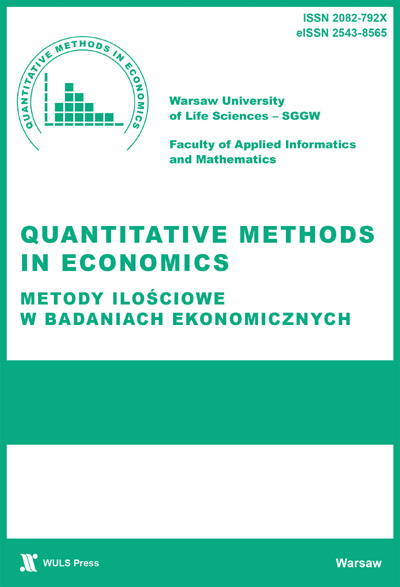Main Article Content
Article Details
Beigl P., Lebersorger S., Salhofer S. (2008) Modelling Municipal Solid Waste Generation: A Review. Waste Management, 28(1), 200-214. (Crossref)
Beretta C, Stoessel F., Baier U., Hellweg S. (2013) Quantifying Food Losses and the Potential for Reduction in Switzerland. Waste Management, 33(3), 764-773. (Crossref)
Bernstad A., la Cour Jansen J. (2012) Review of Comparative LCAs of Food Waste Management Systems – Current Status and Potential Improvements. Waste Management, 32(12), 2439-2455. (Crossref)
Bilska B., Kołożyn-Krajewska D. (red.) (2016) Model ograniczenia strat i marnowania żywności z korzyścią dla społeczeństwa (MOST). Wyd. Nauk. PTTŻ, Kraków, 8-9 (in Polish).
Borkowski B. (2003) Systemy informacyjne w rolnictwie na potrzeby Wspólnej Polityki Rolnej. Wydawnictwo SGGW, Warszawa, s.15 (in Polish).
Bräutigam K.-R., Jörissen J., Priefer C. (2014) The Extent of Food Waste Generation across EU-27: Different Calculation Methods and the Reliability of their Results. Waste Management & Research, 32(8), 683-694. (Crossref)
Caldeira C., Corrado S., Sala S. (2017) Food Waste Accounting. Methodologies, Challenges and Opportunities. JRC Technical Reports, European Commission, p. 10.
Corrado S., Ardente F., Sala S., Saouter E. (2017) Modelling of Food Loss within Life Cycle Assessment: From Current Practice towards a Systematisation. Journal of Cleaner Production, 140, p. 850. (Crossref)
Duchin F. (2005) Sustainable Consumption of Food: A Framework for Analyzing Scenarios about Changes in Diets. Journal of Industrial Ecology, 9(1-2), 99-114. (Crossref)
Dyrektywa Parlamentu Europejskiego i Rady 2008/98/WE z dnia 19 listopada 2008 r. w sprawie odpadów (in Polish).
FAO (2011) Global Food Losses and Food Waste: Extent, Causes and Prevention.
Food Loss and Waste Accounting and Reporting Standard (2016), Version 1.1, World Resources Institute.
FUSIONS (2014) Report on Review of (Food) Waste Reporting Methodology and Practice, FUSIONS Reducing Food Waste through Social Innovation.
FUSIONS (2014) Definitional Framework for Food Waste Full Report. Anex C, 78-100.
FUSIONS (2016) Food Waste Quantification Manual to Monitor Food Waste Amounts and Progression.
Gustavsson J. et al. (2011) Global Food Losses and Food Waste – Extent, Causes and Prevention, FAO, Rome.
Household Food and Drink Waste in the United Kingdom (2013) WRAP.
Joosten L. A. J., Hekkert M. P., Worrell E., Turkenburg W. C. (1998) STREAMS: a New Method for Analysing Material Flows through Society. Resources, Conservation and Recycling, 27(3) 249-266. (Crossref)
Karadimas N. V., Loumos V. G. (2008) GIS-based Modeling for the Estimation of Municipal Solid Waste Generation and Collection. Waste Management & Research, 26(4), 337-346. (Crossref)
Krajewski K., Lipińska M., Wrzosek M., Bilska B., Kołożyn- Krajewska D. (2016) Food Waste - Four Dimensions of Security Economic, Social, Energy and Environmental. INTERCATHEDRA, 32/2, 47-53.
Krajewski K., Świątkowska M., Łaba S., Szczepański K. (2018) Losses and Waste in Meat Supply Chain, and the Needs of Product Management and Market Communication. Proceedings of the SUM2018 / 4th Symposium on Urban Mining and Circular Economy (21-23 may 2018) Bergamo, Italy, https://www.urbanmining.it/.
Kwasek M. (red.) (2016) Analiza strat i marnotrawstwa żywności na świecie i w Polsce. Z badań nad rolnictwem społecznie zrównoważonym, 37, Instytut Ekonomiki Rolnictwa i Gospodarki Żywnościowej, Państwowy Instytut Badawczy, Warszawa (in Polish).
Langley J., Yoxall A. and others (2010) Food for Thought? – A UK Pilot Study Testing a Methodology for Compositional Domestic Food Waste Analysis. Waste Management & Research, 28(3), 220-227. (Crossref)
PN-EN ISO 22000:2006 Systemy zarządzania bezpieczeństwem żywności Wymagania dla każdej organizacji należącej do łańcucha żywnościowego (2006) PKN, Warszawa (in Polish).
Preparatory Study on Food Waste Across EU27. European Commission, BIOIS, 2010.
State-of-play on the Global Food Loss Index to monitor SDG 12.3. 2017.
Downloads
- Radosław Cellmer, Marcelina Zapotoczna, SPATIAL ANALYSIS OF LOCAL HOUSING REAL ESTATE PRICE CHANGES (USING OLSZTYN AS AN EXAMPLE) , Metody Ilościowe w Badaniach Ekonomicznych: Tom 19 Nr 1 (2018)
Możesz również Rozpocznij zaawansowane wyszukiwanie podobieństw dla tego artykułu.
- Zbigniew Binderman, Bolesław Borkowski, Wiesław Szczesny, Rafał Zbyrowski, O PROBLEMACH STOSOWALNOŚCI MIERNIKÓW SYNTETYCZNYCH DO PORZĄDKOWANIA OBIEKTÓW , Metody Ilościowe w Badaniach Ekonomicznych: Tom 21 Nr 4 (2020)
- Zbigniew Binderman, Bolesław Borkowski, Wiesław Szczesny, ZASTOSOWANIE METRYKI MINKOWSKIEGO DO POMIARU ZMIAN KONCENTRACJI , Metody Ilościowe w Badaniach Ekonomicznych: Tom 14 Nr 3 (2013)
- Mikołaj Niedek, Sylwia Łaba, Krystian Szczepański, Karol Krajewski, METODY ILOŚCIOWE W BADANIU STRAT I MARNOTRAWSTWA ŻYWNOŚCI W SEKTORZE PRODUKCJI PIERWOTNEJ , Metody Ilościowe w Badaniach Ekonomicznych: Tom 20 Nr 4 (2019)
- Bolesław Borkowski, Marek Karwański, Wiesław Szczesny, PORÓWNANIE SKUTECZNOŚCI DWÓCH KULTUR ANALITYCZNYCH , Metody Ilościowe w Badaniach Ekonomicznych: Tom 22 Nr 4 (2021)
- Grzegorz Koszela, Zbigniew Binderman, Bolesław Borkowski, Ryszard Kozera, Wiesław Szczesny, ON THE CHOICE OF SYNTHETIC MEASURES FOR ASSESSING ECONOMIC EFFECTS , Metody Ilościowe w Badaniach Ekonomicznych: Tom 18 Nr 1 (2017)
- Zbigniew Binderman, Bolesław Borkowski, Wiesław Szczesny, WYKORZYSTANIE WZORCÓW POŚREDNICH DO BUDOWY MIERNIKÓW SYNTETYCZNYCH , Metody Ilościowe w Badaniach Ekonomicznych: Tom 21 Nr 3 (2020)
- Ryszard Budziński, Mariusz Doszyń, Bolesław Borkowski, Artur Wiliński, UŻYTECZNOŚĆ METOD PROGNOZOWANIA SPRZEDAŻY Z ZASTOSOWANIEM RELACJI PRZEWYŻSZENIA – ELECTRE TRI , Metody Ilościowe w Badaniach Ekonomicznych: Tom 19 Nr 2 (2018)
- Zbigniew Binderman, Bolesław Borkowski, Wiesław Szczesny, An application of radar charts to geometrical measures of structures’ of conformability , Metody Ilościowe w Badaniach Ekonomicznych: Tom 12 Nr 1 (2011)
- Zbigniew Binderman, Bolesław Borkowski, Wiesław Szczesny, Radar coefficient of concentration , Metody Ilościowe w Badaniach Ekonomicznych: Tom 13 Nr 2 (2012)
- Zbigniew Binderman, Bolesław Borkowski, Wiesław Szczesny, Radar measures of structures’ conformability , Metody Ilościowe w Badaniach Ekonomicznych: Tom 11 Nr 1 (2010)

Utwór dostępny jest na licencji Creative Commons Uznanie autorstwa – Użycie niekomercyjne 4.0 Międzynarodowe.
Publikowane artykuły dostępne są na warunkach Open Access na zasadach licencji Creative Commons CC BY-NC – do celów niekomercyjnych udostępnione materiały mogą być kopiowane, drukowane i rozpowszechniane. Autorzy ponoszą opłatę za opublikowanie artykułu.





